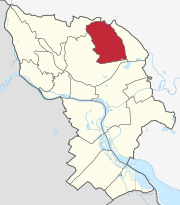Rača
| Rača | |
|---|---|
| coat of arms | map |

|

|
| Basic data | |
| State : | Slovakia |
| Kraj : | Bratislavský kraj |
| Okres : | Bratislava III |
| Region : | Bratislava |
| Area : | 23.659 km² |
| Residents : | 24,419 (Dec 31, 2020) |
| Population density : | 1,032 inhabitants per km² |
| Height : | 154 m nm |
| Postal code : | 831 XX |
| Telephone code : | 0 2 |
| Geographical location : | 48 ° 13 ' N , 17 ° 9' E |
| License plate : | BA, BL, BT |
| Kód obce : | 529354 |
| structure | |
| Community type : | district |
| Administration (as of November 2018) | |
| Mayor : | Michal Drotován |
| Address: | Miestny úrad Bratislava-Rača Kubačova 21 831 06 Bratislava |
| Web presence: | www.raca.sk |
| Statistics information on statistics.sk | |
Rača (until 1946 in Slovak "Račištorf", until 1927 "Račistorf" or "Rastislavice"; German Ratzersdorf , older also Rat (zi) schdorf ; Hungarian Récse ) is a district in the north of Bratislava , at the foot of the Little Carpathians .
Description and history
The area is an old settlement site (Paleolithic, Celtic, Roman, early Slavic times). The Slovak community Okol (Old Slovak for "cattle fence") originally stood in the area of today's municipality. From this later parish, the parish of Racha split off in the course of the 13th century. The name is derived either from the Slovak Rak-ja (to rak , "crayfish") or from the Slovak personal name Racha (Radša) mentioned in the documents. The new community was settled by German settlers in the 13th century and the name was Germanized.
In the form of Rača, the place was first mentioned in 1296 as villa Racha and over the centuries it has been a wine-growing community with a strong German-speaking population. Until 1946 it was independent under the Slovak name Račistorf , but then came to the city of Bratislava as a district and was renamed Rača .
District structure
The district is divided into the following further (unofficial) quarters:
- Krasňany
- Rača (Ratzersdorf)
- Východné
population
According to the 2011 census, the Rača district had 19,679 inhabitants, of whom 17,933 were Slovaks , 392 Magyars , 264 Czechs , 50 Moravians , 41 Germans , 35 Russians , 27 Russians , 20 Bulgarians , 19 Ukrainians , 18 Roma , 14 Poles , 11 Jews and nine Croatians and five Serbs . 151 inhabitants stated a different ethnic group and 690 inhabitants did not give any information about the ethnic group .
10,541 residents committed themselves to the Roman Catholic Church , 1004 residents to the Evangelical Church AB , 184 residents to the Greek Catholic Church , 92 residents to the Orthodox Church , 86 residents to the Jehovah's Witnesses , 69 residents to the Reformed Church, 50 residents to the Evangelical Methodist Church, 42 residents in the Christian community, 39 residents in the Baptist Church, 33 residents in the Apostolic Church, 27 residents in the Brethren movement, 26 residents in the Czechoslovak Hussite Church, 19 residents in the Jewish community, eight residents each in the Baha'itum and eight in the Seventh-day -Adventists, seven residents for the Old Catholic Church and one resident for the New Apostolic Church. 205 residents professed a different denomination, 5597 residents were non-denominational and the denomination was not determined for 1638 residents.
Personalities
- Edita Gruberová (1946-2021), Slovak soprano
- Eva Krížiková (1934-2020), Slovak actress
- Ignaz Schnitzer (1839–1921), librettist for the Gypsy Baron
- Ján Šebela (1907–1992) SDB , Catholic priest , youth minister, forced to emigrate for the faith.
- Peter Machajdík (* 1961), Slovak composer
Web links
Individual evidence
- ↑ Results of the 2011 census. Accessed November 29, 2021 (Slovak).
- ↑ KUBANOVIČ, Zlatko: Historický náhľad do dejín slovenských saleziánov (Od dona Bosca do roku 1924) . Bratislava: Don Bosco, 2019. ISBN 978-80-8074-436-6 . P. 278.

